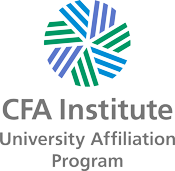Finance Major
In addition to the Drake Curriculum requirements and business core requirements (required of all business majors), there are 21 hours of core courses required of all finance majors, and nine hours of electives that allow students to specialize in their chosen are of interest.
Students spend two years building core business skills (accounting, law, economics, mathematics, statistics). The core Finance curriculum includes introductory and advanced corporate finance; money and banking; financial institutions, instruments, and markets; portfolio analysis; and a capstone seminar in finance. Additional courses depend on the track selected and the student’s interests.
Finance Core Requirements
- FIN 102 - Advanced Corporate Finance
- FIN 119 - Financial Institutions, Instruments, and Markets
- FIN 121 - Introduction to Derivatives
- FIN 170 - International Finance
- FIN 193 - Portfolio Analysis
- FIN 197 - Seminar in Finance
- ECON 10 - Principles of Macroeconomics
These courses provide the student with a thorough grounding in each of the functional areas of the finance discipline. It is recommended that students take ECON 10 in the first year; FIN 101 in the sophomore year; FIN 102 and FIN 119 in the junior year; FIN 121, FIN 170, FIN 193 and FIN 197 in the senior year. Students should complete IS 44 in the first year and STAT 71 & STAT 72 by the end of the sophomore year.
In addition, all candidates must also choose at least 9 hours from the courses listed below; at least 3 credits should come from finance electives. The course groups below are provided to align the electives with typical career interests; however, the final selection may be from any of the courses listed.
- Finance Electives (3~9 Credits; must choose at least one 100-level finance course)
- FIN 129 – Financial Institutions Management
- FIN 150 – Introduction to FinTech
- FIN 190 – Equity Valuation and Analysis
- FIN 198 – Special Topics in Finance
- Career Track Electives (0~6 Credits)
- Financial Data Analytics
- ECON 170 – Introduction to Econometric
- IS 107 – Programming and Application Development
- IS 114 – Advanced IT Applications for Business
- IS 160 – Database Management
- CS 167 – Machine Learning
- STAT 130 – Probability for Analytics
- STAT 170 – Regression and Time Series
- STAT 172 – Data Mining/General Linear Models
- 2. Investment Analytics/Asset Management
- ACCT 165 – Financial Accounting I
- ACCT 166 – Financial Accounting II
- ACCT 167 – Financial Accounting III
- ECON 130 – International Economics
- ECON 174 – Intermediate Macroeconomic Analysis
- 3. Personal Financial Planning
- ACCT 185 – Individual Taxation
- BLAW 120 – Business Law II
- ECON 109 – Public Economics
- INS 051 – Personal Risk Management
- INS 141 – Business Risk Management
- 4. Financial Institutions Management
- BLAW 180 – Legal Issues/Bus Organizations
- ECON 120 – Regulation & Antitrust Policy
- INS 141 – Business Risk Management
- INS 161 – Insurance Company Operations
- 5. Corporate Finance/Corporate Treasury
- ACCT 110 – Managerial Accounting
- ACCT 120 – Advanced Managerial Accounting
- ACCT 175 – Auditing Principles
- ECON 173 – Intermediate Microeconomic Analysis
- Financial Data Analytics



